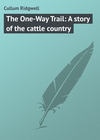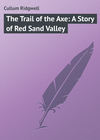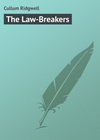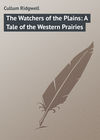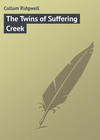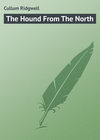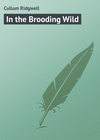Czytaj książkę: «The One-Way Trail: A story of the cattle country», strona 16
“So long.”
As the horseman passed the hut Eve and Elia were standing before the closed door. Jim saw them, but he would not pause. However, his keen ears heard the whispered “God bless you” which the woman threw after him. And somehow he felt that nothing else in his life much mattered.
A few moments later Eve was at her gate, fumbling for the latch. Elia was at her side, looking out at the lights of the village. Suddenly he turned and raised his beautiful face to hers.
“Say, sis, you’re a fule woman,” he declared sharply. He was listening to the sounds of bustle down at the saloon. “Can’t you hear? That’s the boys. They’ve come in, and they’re gettin’ ready to start with Doc. If they get him–they’ll hang him.”
“Him? Who? What d’you mean?”
The terrified woman was staring down into his calm eyes.
“Why–Jim.”
“Oh, God, no! They can’t! They won’t! He’s too good–too brave! God will never let them. It would be too cruel.”
“Say, I guess you’d be sorry some?”
“Sorry?”
But Eve was fumbling again at the gate. Nor could the boy extract another word from her.
CHAPTER XXV
THE TRAIL OF THE RUSTLERS
The blackness of night begins to stir. Ahead and above roll vague shadows, darkening, threatening, in the immensity of their wave-like shapes. Away behind the stars shine pitifully, for a dim gray light in the east heralds the coming of day. Slowly the shadows change from black to a faint gray, and their rolling becomes more pronounced. Now, with each passing moment, the eastern light grows, and the darkness of the west responds; now, too, the shadows show themselves for what they are. They stir and seethe like the churning of water nearly boiling, under the rising zephyrs of mountain air. They are the dense morning mists, a hazy curtain shutting out the mountain splendor beyond.
In less than half an hour a wonderful metamorphosis. A tinted fringe of cloud appears on the mists high up, and gives the impression of a beam of sunlight amidst the shadows. But no sun has broken the eastern sky-line, nor will it for another half-hour. Yet the light increases, and the swirling mists become a rosy cloudland, deep, ruddy, and exquisitely beautiful. The living fog rolls up, lifting, lifting, and every moment the picture grows in beauty and in its wonders of changing colors.
Eastward the horizon lights a glowing yellow, shot with feathery dashes of ruddy orange; yellow to green, and then the gray of the high starlit vault. But the stars are dimming, whimpering under their loss of power. Their archenemy of day is approaching, and they must shrink away and hide till the fiery path of the monarch of the universe cools, and they are left again to their own.
Doc Crombie was riding at the head of his men when the sun cleared the horizon. He was staring ahead at the still hazy foot-hills, the hiding-place of the criminal he sought. The light of battle was in his keen, quick, luminous eyes. His face was set and stern. There was no mercy in the set of his jaws, in the drawn shaggy brows. He was out to rid the country, his country, of a scourge, a pestilence neither he nor his fellow townsmen would tolerate.
The rest of the vigilantes rode behind him, no less stern-faced than their leader. With fresh horses they had traveled long and hard that night. The journey had been chilly, and the trail rough. Their tempers were at a low ebb, and the condition only added to their determination to hang the man as soon as he was in their power.
Doc drew rein suddenly and called Smallbones to his side. The trail, which had now faded into something little better than a cattle track, was leading into the mouth of a narrow valley, bordered on either side by towering, forest-clad hills. He pointed ahead.
“That blamed kid said we’d keep right on down this cuttin’ to the third hill on the left,” he said. “It’s nigh four miles. Then we’d find a clump of scrub with two lone pines standin’ separate. Here we’d get a track of cattle marked plenty. Then we’d follow that for nigh two miles, and we’d drop into the rustlers’ hollow.”
“Sure. Don’t sound a heap o’ trouble,” said Smallbones, cheerfully.
“Say, I’m not figgerin’ the trouble. But we’ve traveled slow. We won’t make it for an hour an’ more, an’ we’re well past sun-up now. It was waitin’ for the boys to git in. I sort o’ wish I’d brought that kid along.”
They were moving on again at a rapid canter, and Smallbones was riding at his side. The little man, like the rest, was armed liberally. But whereas the others were, for the most part, content with two guns, he had four. It would not be for lack of desire on his part if somebody did not die before noon.
“We couldn’t help startin’ late,” grumbled the little man. “An’ as fer that kid, I’d sure ’a’ kep’ him with us. Who’s to say he ain’t handed us a fool game? He’s a crank, anyways, an’ orter be looked after by State. He guessed he see the rustlers at work, but didn’t rec’nize ’em. I said right then he was bluffin’. D’you think he wouldn’t know Jim Thorpe?”
“Barkin’ that yet, eh!” retorted Doc, sharply. “Say, boy,” he went on with a great contempt, “you’re dirty. Jim Thorpe ain’t the man we’re after. Leastways I won’t believe it till we git him red-handed. I wouldn’t be out to-night if I thought it was Jim Thorpe. We left him back ther’ in the village. He’s been out two days chasin’ for rustlers. See here, you’re mean on him ’bout this thing, because things are queer his way. An’ you ain’t got savvee to see that it’s ’cos things is queer his way is just the reason he ain’t the dogone rustler we’re chasin’. You need to think a sight more. Mebbe it hurts some, but it’s a heap good.”
Smallbones shot a swift, sidelong glance at the doctor, in which there was little enough friendliness. He probably had no friendliness for anybody.
“I’ll hand you a noo buggy to a three-year-old driver he’s our man,” he snapped.
“Done,” grinned the sporting doctor promptly. And Smallbones was the least bit sorry he had laid so generous odds.
By this time day was in its full early-morning glory, but they were passing from the dazzling light of the plains into the more sheltered atmosphere of the valley. Everywhere the hills rose about them, on either side and ahead. The gloomy woods on the vast slopes threw a marked shadow over the prospect. Ahead lay a wide vista of tremendous mountains, with their crowning, snow-bound peaks lost in a world of gray, fleecy cloud. In the heart of one distant rift lay the steely bed of a glacier, hoary with age and immovable as the very bedrocks of the mountains themselves. It sloped away into the distance, and lost itself in the heart of a mighty cañon. Even to these men on their trail of death, living, as they did, so adjacent to these mysterious wilds, the scene was not without its awe.
The doctor was watching the hills to the left. The first one seemed endless, and he sought a break in it in every shadowed indentation upon its face. He was feeling more anxious than his own words suggested. He was a shrewd man who had understood the ring of truth in Elia’s story at once, but now, in face of this stupendous world, he was wondering if he had been well advised in leaving the boy behind. He had only done so on the score of his crippled condition being a nuisance to them. However, his doubt found no further expression now, and his keen eyes watched for the landmarks in a way that left him little chance of missing them.
At last the first hill came to a distinct end, and the second rose higher and more rough. Its face was torn and barren, and what timber there was grew low down almost at its foot. The valley was narrowing, and the rich prairie grass was changing to a lank tangle of weedy tufts. There was a suspicion of moisture, too, in the spongy tread. The sun further lost power here, between these narrowing crags, and, although summer was well advanced, the ground still bore the moist traces of the mountain spring.
The second hill was passed quickly. It was merely a split of the original mountain, the result, no doubt, of a great volcanic upheaval in the early days of the world. And now, as they rode on, the third and last landmark before the two lone pines rapidly slipped away behind them.
The leader bustled his horse. His nervous force was at a great tension of impatience. He, like the rest of the merciless band, was yearning for his goal.
At last the two lone pines loomed up. The eyes of the men brightened with eagerness, and their leader felt certain of the faith he had placed in Elia’s story. Now for the cattle tracks.
As they came abreast of the low bush, the doctor scattered his men in various directions to hunt for the trail. Nor did the matter take long. In less than five minutes two of the ranch hands lit on the tracks simultaneously. A great broad track of hoof-marks deeply indented in the soft ground stretched away up over the shoulder of the hill. So plain were they that the horsemen were able to follow them at a gallop.
Away up the hillside they sped. The way was a sharp incline, but smooth and wide, and free from obstruction. And in ten minutes they were pausing to breathe their hard-blowing horses on the shoulder of the hill, with a wide view and a level track ahead of them.
The doctor turned to order a careful redistribution. They were near the rustlers’ hollow now, he believed, and it was his intention to leave nothing to chance. Each man received his instructions for the moment when the hollow should be reached, for Elia had given him full details of its locality, and the possibilities of approach.
He knew it to be a mere cup, with, apparently, no entrance or exit, except the way they were now approaching it. It had appeared to Elia to be surrounded by towering hills, densely clad in forests of spruce and pine. He had described the corral as being on the left front from the entrance, and that a hut, backing into the flanking woods, occupied the distance on the right.
The doctor’s disposition, in consequence, was simple. The whole party were to race at a gallop into the hollow. The eight leaders were to ride straight for the hut, no matter what fire might be opposed to them. The six men immediately in their rear were to open out and ride for the encompassing fringe of woods, lest any of the rustlers should make for escape that way. While the rest of the party were to ride for the corral, and round up everything that looked like a saddle horse; this last with a view to preventing any chances of ultimate escape.
These matters settled they continued their journey without loss of time. For every man of them was sternly eager to come to clinches with their quarry. The excited interest was running high as they neared their goal. Then all at once Smallbones suddenly threw the whole party into confusion by flinging his horse abruptly upon its haunches, and wildly pointing up the hillside on their immediate left.
“Gee!” he cried, furiously. “Look at that. There! There! There he goes!”
But there was no need for his added explanation. Two hundred yards away to their left a horseman was racing headlong in a parallel direction. It needed no imagination to tell them that he was a scout carrying the alarm to his comrades in the hollow beyond.
But his course was a different one to that which might have been expected, for it showed no signs of converging with the track below, and was significant of an unsuspected, possibly secret entrance to the hiding-place.
But the doctor was a man for emergency. Four of the men carried rifles, and these he warned to be ready to fire on the fugitive when he gave the word.
Then he led his men at a race down the track.
It was an inspiring spot for the imaginative.
A little cup of perfect emerald green set within the darker border of the soft pinewoods. Above, the brilliant sky poured down a dazzling light through the funnel-like opening walled by an almost complete circle of hills. But the circle was not quite complete. There were three distinct, but narrow rifts, and they opened out in three widely opposite directions. The cup rim was almost equally divided into three.
In a spacious corral of raw timbers a number of cattle were moving restlessly about, vainly searching for something with which to satisfy their voracious morning appetites. Close beside the corral was a small branding forge, its fire smouldering dismally in the chill air. Round about this, strewn upon the trampled grass, lay a number of branding irons, coiled ropes, and all the paraphernalia of a cattle-thief’s trade, while beside the corral itself were three telltale saddle horses, waiting ready for their riders on the first sound of alarm.
Fifty yards away stood a log hut. It was solid and practical, and comparatively capacious. A couple of yards away a trench fire was burning cheerfully. And over it, on an iron hook-stanchion, was suspended a prairie cooking “billy,” from which a steaming aroma, most appetizing at that hour of the morning, was issuing. Various camping utensils were scattered carelessly about, and a perfect atmosphere of the most innocent homeliness prevailed.
On the sill of the hut door Will Henderson was seated smoking, with his elbows planted on his knees, and his two hands supporting the bowl of his pipe. His eyes were as calmly contemplative as those of the stolen cattle in the corral.
To judge by his expression, he had no thought of danger, and his affairs were prospering to his keenest satisfaction. His handsome boyish face had lost all signs of dissipation. His eyes, if sullen, were clear, with the perfect health of his outdoor, mountain life. Nor was there anything of the vicious cattle-rustler about him. His whole expression suggested the hard-working youngster of the West, virile, strong, and bursting with the love of life.
But here, again, appearances were all wrong. Will’s mood at that moment was dissatisfied, suspicious. He was yearning for the flesh-pots of town, as exampled by the bad whiskey and poker in Silas Rocket’s saloon.
Lying on the ground, close against the hut wall, two low-looking half-breeds in gaudy shirts, and wearing their black hair long and unkempt, were filling in the time waiting for breakfast, shooting “crap dice.” The only words spoken between them were the filthy epithets and slang they addressed to the dice as they threw them, and the deep-throated curses as money passed between them.
No, there was little enough to suggest the traffic in which these men were engaged. Yet each knew well enough that the shadow of the rope was hanging over him, and that, at any moment, he might have to face a life and death struggle, which would add the crime of murder to the list of his transgressions.
Will slowly removed his pipe from his mouth.
“Say, ain’t that grub ready?” he growled. “Hi, you, Pete, quit those dice an’ see to it. You’re ‘chores’ to-day. We’ve got to make forty miles with those damned steers before sun-up to-morrow.”
“Ho, you. Git a look at the grub yourself. Say–”
He broke off listening. Then he dropped the dice he was preparing to throw, and a look of alarm leaped to his eyes. “I tink I hear hoofs. Hush!”
Will was on his feet in a second. The sullen light had vanished from his eyes and a startled look of apprehension replaced it.
“Those plugs cinched up?” he demanded sharply. And mechanically his hand fell on the butt of one of the guns at his waist.
“Sure,” nodded the other half-breed.
All three listened acutely. Yes, the sound of galloping was plain to their trained hearing. The mountains carried a tremendous echo.
Without further words all three men set off at a run for the corral. Will was the fleetest and reached his horse first. In a second he was in the saddle and sat waiting, and listening for the next alarming sound.
“It’s Ganly, sure,” he muttered, turning one ear in the direction of the rapidly approaching sound.
“Sounds like dogone ‘get out,’” cried Pete, sharply. The shadow of the rope was very near him at that moment.
The other half-breed nodded.
“Hist!” A sudden fear leaped into Will’s eyes. “There’s others,” he cried. “Come on, and bad luck to the hindmost! Joe’s safe. He can get clear by the south trail. They can’t follow that way. I’m for the northeast. You best follow. Gee!”
His final exclamation burst from him at the echoing reports of several rifles. And now the sound of galloping hoofs was very near. The men waited no longer. Will set spurs into his horse, and the half-breeds, following him, raced for the northeast exit from the hollow.
But they had waited just a second or two longer than was safe. For, as they reached the forest path, and were vanishing beneath the shadowy trees, a fierce yell went up behind them. Pete, looking back over his shoulder, hissed his alarm to his speeding comrades.
“Ho, boy, it’s Doc Crombie, an’ a whole gang. An’ dey see us, too, sure. But dey never catch us!”
Spurs went into their horses’ flanks and the race began. For the noose of the rope was looming large and ominous before their terrified eyes.
A quarter of a mile from the hollow they divided and went their ways in three different directions.
CHAPTER XXVI
ON THE LITTLE BLUFF RIVER
Away to the west, where the plains cease and the hills begin, where the Little Bluff River debouches upon the plains from its secret path through cañon and crevasse, Jim Thorpe was standing beside a low scrub bush, gazing ruefully at his distressed horse. The poor brute was too tired to move from where he stood, nipping at the rich prairie grass about his feet. He still had the strength and necessary appetite to do this, but that was about all.
In his anxiety to serve the woman he loved Jim had done what years ago he had vowed never to do. He had ridden his willing servant to a standstill.
The saddle had been removed for more than an hour and was lying beside the bush, and the man, all impatience and anxiety, was considering his position and the possibility of fulfilling his mission. The outlook was pretty hopeless. He judged that he had at least ten miles to go, with no other means of making the distance than his own two legs.
And then, what would be the use? Doc Crombie was probably on the road. He had heard the men preparing for the start before he left the village. True, they had not overtaken him, but that was nothing. There were other ways of reaching the rustlers’ hollow. He knew of at least three trails, and the difference in the distance between them was infinitesimal.
For all he knew the other men might have already reached their destination. Yes, they probably had. He had been out of the saddle more than an hour. It was rotten luck. What would Eve think? He had failed her in her extremity. At least his horse had. And it was much the same thing. He realized now the folly of his attempt on a tired horse. But then there had been no time to get a fresh one. No possibility of getting one without rousing suspicion. Truly his luck was devilish.
He sat down, his back propped against the stump of a dead sapling. And from beneath the wide brim of his hat, pressed low down upon his forehead, he gazed steadily out over the greensward at the southern sky-line. His face was moody. His feelings were depressed. What could he do? In profound thought he sat clasping one knee, which was drawn up almost to his chin.
The beauty and peace of the morning had no part in his thoughts just now. Bitter and depressed feelings alone occupied him. Behind him the noisy little river sped upon its tumultuous way, just below sharp, high banks, and entirely screened from where he sat. There was a gossipy, companionable suggestion in the bustling of the noisy waters. But the feeling was lost upon him. He prayed for inspiration, for help. It was not for himself. It was for a woman. And the bitterness of it all was that he, he with all his longing, was denied the power to help her.
He turned from the hills with a feeling of irritation. Away to his left the prairie rolled upward, a steady rise to a false sky-line something less than a mile away. There was sign of neither man, nor beast, nor habitation of any sort in the prospect. There was just the river bank on which he sat to break up the uniformity of the plain. Here was bush, here were trees, but they were few and scattered.
Presently he rose from his seat and moved over to his horse. The animal lifted its head and looked wistfully into his face. The man interpreted the appeal in his own fashion. And the look hurt him. It was as if the poor beast were asking to be allowed to go on feeding a little longer. Jim was soft-hearted for all dumb animals, and he quietly and softly swore at his luck. However, he resaddled the animal to protect its back from the sun and turned back again to the bush.
But he never reached his seat. At that instant the quiet was suddenly and harshly broken. The stillness of the plain seemed literally split with the crack of firearms. Two shots rang out in rapid succession, and the faintest of echoes from the distant hills suggested an opposing fire at long range. But the first two shots were near, startlingly near.
All was still again. The man stood staring out in the direction whence came those ominous sounds. No, all was not quite still again. His quick ears detected a faint pounding of hoofs, and a racing thought flew through his brain. His movements became swift, yet deliberate. He crossed over to his horse and replaced the bit in its mouth. Then he faced round at the rising ground and watched the sky-line. It was thence that the reports had come, and his practiced ears had warned him that they were pistol shots.
Now he shaded his eyes gazing at one particular spot on the sky-line. For his horse, too, was gazing thither, with its ears sharply pricked. And, in consequence, he knew that the man, or men who had fired those shots were there, beyond the rise.
He waited. Suddenly a moving speck broke the sky-line. Momentarily it grew larger. Now it was sufficiently silhouetted for him to recognize it. A horseman was coming toward him, racing as hard as spurs could drive the beast under him.
Just for a moment he wondered. Then he glanced swiftly round at the river behind him. Yes, the river. This man was riding from the hills. And he understood in a flash. He was pursued. The hounds had him out in the open. The only shelter for miles around was the sparse bush at the riverside, and–the river itself. His interest became excitement, and a sudden wild hope. He now searched the horizon behind the man. There was not a soul in sight–and yet–those two shots.
But the situation suddenly became critical for himself. He realized that the fugitive had seen him. From a low bending attitude over his horse’s neck the man had suddenly sat erect. Also he was gripping a heavy revolver in his hand.
Suddenly a further excitement stirred the waiting man. As the fugitive sat up he recognized him. It was Will Henderson.
He was still a hundred yards away, but the distance was rapidly narrowing. At fifty yards he, Jim, would be well within range, and the memory of those two shots warned him that the revolver in the horseman’s hand was no sort of bluff. It meant business, sure enough, and his own identity was not in the least likely to add to his safety. He must convey his peaceful intentions at once.
It was difficult. He dared not shout. He knew how the voice traveled over the plains. Suddenly he remembered. He was one of the few prairie men who still clung to the white handkerchief of civilization. He drew one out of his pocket. It was anything but clean, but it would serve. Throwing up both arms he waved it furiously at the man. This he did three times. Then, dropping it to the ground, he held up both hands in the manner of a prairie surrender.
There was a moment of anxious waiting, then, to his relief, he saw Will head his hard blowing horse in his direction. But still retaining his hold of his pistol, he came on. And in those few moments before he reached him Jim had an opportunity of close observation.
First he saw that the horse was nearly done. Evidently the chase had been, if short, at least a hard one, and if the hunters were close behind, there was little enough chance of escape for him. The man’s eyes were alight and staring with the suspicious look of the hunted. His young mouth was set desperately, and the watching man read in his face a determination to sell his life at the highest price he could demand. And somehow, in spite of all that had gone, he felt a great pity for him.
Then, in a moment, his pity fled. It was the color of the man’s shirt that first caught his attention. It was identical with his own. From this he examined the rest of his clothing. Will Henderson was clad as much like himself as possible. And the meaning of it was quite plain to him.
The horseman came up. He flung himself back in the saddle and reined his horse up with a jerk.
“What’s your game?” he demanded fiercely, still gripping the threatening revolver, as Jim dropped his hands.
“I came to warn you–but my horse foundered. See.”
Jim pointed at the dejected beast. “I came because she asked me to come,” he added.
Will glanced back up the hill. It needed little enough imagination to guess what he was looking for.
“Well, the game’s up, and–I’m hunted. They’re about three miles behind–all except one.” He laughed harshly. Then he caught Jim’s eyes. “You came because she sent you? That means you’re goin’ to help me, I guess, but only–because she sent you. Are you goin’ to?” He edged his gun forward so that the other could not miss seeing it.
But Jim had no fear. He was thinking with all the power of his brain. Time was everything. He doubted they had more than five minutes. He knew this patch of country by heart, which was one of the reasons he had taken the northern trail. Now his knowledge served him.
He answered instantly, utterly ignoring the threatening gun.
“Yes. Now get this quickly. Your only chance is to drop down into that river. It’s shallow, though swift–about two feet to possibly two and a half. Ride down stream for two miles. It winds tremendously, so the others won’t see you. You’ll come to a thick patch of woods on either bank. Take the left bank, and make through the woods, north. Then keep right on to some foot-hills about ten miles due north. Once there you can dodge ’em, sure. Anyway it’s up to you. Leave ’em to me, when they come up. I’ll do my best to put ’em off.”
Jim’s voice was cold enough, but he spoke rapidly. Will, who had turned again to scan the sky-line, now looked down at him suspiciously.
“Is this bluff–or straight business?” he demanded harshly.
Jim shrugged.
“You best get on–if you’re going to clear. You said they were three miles off,” he reminded him, in the same cold manner.
Will looked back. He was still doubtful, but–he realized he must take the advice. He had delayed too long now for anything else.
“She sent you, eh?” he asked, sharply. “It’s not your own doin’?”
“I’ve no sympathy with–cattle-thieves,” Jim retorted. “Git, quick!”
His eyes were on the horizon now. And it was his alert look that finally decided the doubting man. He swung his horse round, and rode for the river.
“So long,” he called back. But there was no word of thanks. Neither had the other any response to his farewell.
Jim watched him till he disappeared, then he turned again to the rising grassland and watched for the coming of the hunters. And as he watched his thoughts reverted to the doctrine of the one-way trail. Will was traveling it hard. For him there was certainly no turning back now.
But his horse had ceased grazing again, and once more stood with ears pricked, gazing up the slope. Its master understood. This was no moment to consider abstract problems, however they might interest him. Stern reality lay ahead of him, and he knew he was in for an unpleasant time. He linked his arm through his horse’s reins, and, with head bent, trailed slowly up the incline, pausing and stooping to examine the hoof-prints of Will Henderson’s horse, as though it were a trail he had just discovered, and was anxious to learn its meaning. He was thinking hard the while, and calculating his chances when the hunters should come up.
While he appeared to be studying the track so closely, he yet was watching the hill-crest ahead. He knew the men were rapidly approaching, for the rumble of galloping horses was quite distinct to his well-trained ears. He wanted his intentness to be at its closest when the gang first discovered him.
He had his wish. As the men topped the ridge he was on one knee studying a clearer imprint than usual. Doc Crombie and Smallbones, riding at the head of a party of five men, saw him, and the latter shouted his joy.
“Gee! we’ve got him! Say–” He broke off, staring hard at the kneeling figure. The outline was familiar. Suddenly Jim stood up, and the little man instantly recognized him. “Guess you lost that three-year-old ‘driver,’ Doc,” he cried, his face alight with malice. “Ther’s our man, an’–it’s Jim Thorpe. I thought I rec’nized him from the first, when he broke cover. This is bully!”
But the stern-faced doctor had no answer for him. His eyes were fixed on the man, who now stood calmly waiting for him to approach. Experienced in such matters as he was, he looked for the threatening gun in Jim Thorpe’s hand. There was none. On the contrary, the man seemed to be waiting for them in the friendliest spirit. There was his horse, too; why was he on foot? It struck him that the riddle wanted more reading than Smallbones had given it. He was not so sure he had yet lost that three-year-old “driver.”
Jim made no change of position as they clattered up. Smallbones was ahead, with a gun leveled as he came.
“Hands up! Hands up, you dogone skunk, or I’ll blow your roof off!” he cried fiercely.
But Jim only grinned. It was not a pleasant grin, either, for the hardware dealer’s epithet infuriated him.
“Don’t be a blamed fool, Smallbones,” he said sharply. “You’re rattled.”
“Put your darned hands up, or–!”
But Doc Crombie knocked the little man’s gun up.
